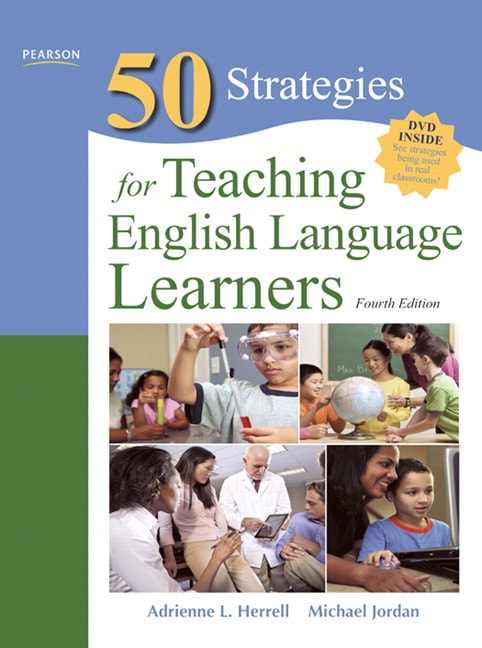
30.00$ - DOWNLOAD
- Digital File Direct & Fast Download ( Bank Exam ZIP & PDF) only for 30.00$
- All chapters are included in the test Bank Exam
- Free samples included once needed (ZIP & PDF)
- Multiple payment options (Paypal , Credit Card) - NO account Required
- Dedicated support / instant chat – Email - Whatsapp
- Digital file of Fifty Strategies for Teaching English Language Learners, 4th Edition for sale
Category : Higher Education
***THIS IS NOT THE ACTUAL BOOK. YOU ARE BUYING the Test Bank in e-version of the following book***
ABOUT THE AUTHORS PREFACE STRATEGIES ON VIDEO SECTION I THEORETICAL OVERVIEW SECTION II STRATEGIES FOR SUPPORTING ACTIVE INVOLVEMENT 1 Predictable Routines and Signals: Reducing Anxiety 2 Preview/Review: Building Vocabulary and Concepts to Support Understanding 3 Visual Scaffolding: Providing Language Support Through Visual Images 4 Small Groups and Partners: Interactions to Enhance Instruction 5 Learning Centers: Extending Learning Through Hands-on Practice 6 Cooperative Learning: Group Interactions to Accomplish Goals 7¿¿¿ Scripting: Practicing Verbal Interactions 8¿¿¿ Multiple Intelligences Strategies: Teaching and Testing to Student-Preferred Learning Modes 9¿¿¿ Culture Studies: Learning Research Skills and Valuing Home Culture in One Project 10¿¿ Manipulatives Strategies: Using Objects to Connect Concepts 11¿¿ KWL and Data Charts: Researching and Organizing Information SECTION III STRATEGIES for LANGUAGE DEVELOPMENT 12 ¿¿ Total Physical Response: Integrating Movement into Language Acquisition 13¿¿¿ Realia Strategies: Connecting Language Acquisition to the Real World. 14¿¿¿ Modeled Talk: Showing While You Talk 15¿¿¿ Vocabulary Role-Play: Building Vocabulary Through Dramatization 16¿¿¿ Leveled Questions: Adjusting Questioning Strategies to the Language Levels of Students 17¿¿¿ Collecting and Processing Words: Making Vocabulary Your Own 18¿¿¿ Reporting Back: Verbal Practice in Curriculum Connections 19¿¿¿ Story Reenactment: Making Stories Come to Life! 20¿¿¿ Language Focus Lessons: Planning Lessons to Support the Acquisition of English Vocabulary and Structures 21¿¿¿ Language Framework Planning: Creating Lessons that Support Academic Language & Content Acquisition 22¿¿¿ Syntax Surgery: ¿Visually Manipulating English Grammar 23¿¿¿ Communication Games: Creating Opportunities for Verbal Interaction SECTION IV STRATEGIES FOR LITERACY DEVELOPMENT 24¿¿¿ Moving into Reading: Using interactive read-aloud& shared reading to foster comprehension 25¿¿¿ Sorting Activities: Organizing Information into Categories 26¿¿¿ Read Aloud Plus: Using Strategies to Support Comprehension 27¿¿¿ Guided Reading: Providing Individual Support within a Group Setting 28¿¿¿ Scaffolding English Writing: Matching Instruction to Language Development 29¿ Imaging: Creating Visual Pictures to Support Understanding 30¿ Cohesion Links: Understanding the Glue that Holds Paragraphs Together 31¿ Bilingual Books and Labels: Supporting Biliteracy Awareness 32¿ Read, Pair, Share: Working with a Partner to Negotiate Meaning 33 Repetition and Innovation: Getting to Deep Comprehension Through ¿¿¿¿ Multiple Interactions with a Book 34¿¿¿ Cloze: Using Context to Create meaning 35¿ Free Voluntary Reading: Nothing Helps reading Like Reading 36¿ Repeated Readings: Using Script Writing and Reader’s Theatre to Develop Comprehension and Fluency SECTION V STRATEGIES FOR CONTENT INSTRUCTION 37¿¿¿ Advance Organizers: Getting the Mind in Gear for Instruction 38¿¿¿ Learning Strategy Instruction: Acquiring Self-Help Skills 39¿¿¿ Integrated Curriculum Projects: Using Authentic Projects to Bring Knowledge Together 40¿¿¿ Attribute Charting: Organizing Information to Support Understanding 41¿¿¿ Dictoglos: Improving Listening & Communication Skills 42¿¿¿ GIST: Exploring Tough Text 43¿¿¿ Tutorials: Closing the Achievement Gap 44¿¿¿ Graphic Organizers: Visually Representing Ideas, Text, & Connections 45¿¿¿ Microselection: Finding Key Words & Main Ideas 46¿¿ Collaborative Reading: What to do When They Can’t Read the Textbook¿ SECTION VI ¿TECHNOLOGY STRATEGIES 47¿¿¿ Multimedia Presentations: Oral Reports for the New Millennium 48¿¿¿ Interactive Comprehension Building: Using Technology to Build Background Knowledge 49¿¿¿ Wiki Building: ¿Using Websites to Support Reading, Writing, and Vocabulary Development 50¿¿¿ Handheld Computer and Smartphones: Applications In and Out of the Classroom Teacher Resources ¿¿¿¿ A¿¿¿ An Informal Multiple Intelligences Survey ¿¿¿¿ B¿¿¿ English Language Development Profiles ¿¿¿¿ C¿¿¿ English Language Development A TESOL Standard Correlation Chart Table of Contents
Manual solution Fifty Strategies for Teaching English Language Learners, 4th Edition for sale , Fifty Strategies for Teaching English Language Learners, 4th Edition for sale , Fifty Strategies for Teaching English Language Learners, 4th Edition pdf for sale , Adrienne L. Herrell, Florida State University Michael L. Jordan, California State University, Fresno


0 commentaires:
Enregistrer un commentaire